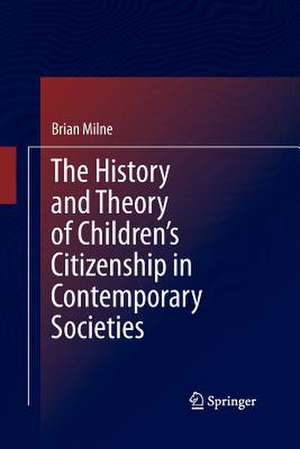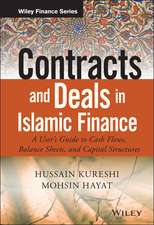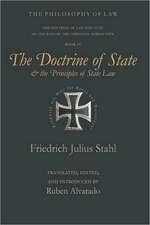The History and Theory of Children’s Citizenship in Contemporary Societies
Autor Brian Milneen Limba Engleză Paperback – 22 mai 2015
| Toate formatele și edițiile | Preț | Express |
|---|---|---|
| Paperback (1) | 562.30 lei 38-44 zile | |
| SPRINGER NETHERLANDS – 22 mai 2015 | 562.30 lei 38-44 zile | |
| Hardback (1) | 573.21 lei 38-44 zile | |
| SPRINGER NETHERLANDS – 30 apr 2013 | 573.21 lei 38-44 zile |
Preț: 562.30 lei
Preț vechi: 702.87 lei
-20% Nou
Puncte Express: 843
Preț estimativ în valută:
107.59€ • 112.35$ • 88.85£
107.59€ • 112.35$ • 88.85£
Carte tipărită la comandă
Livrare economică 11-17 aprilie
Preluare comenzi: 021 569.72.76
Specificații
ISBN-13: 9789400799677
ISBN-10: 9400799675
Pagini: 302
Ilustrații: XIV, 302 p.
Dimensiuni: 155 x 235 x 17 mm
Greutate: 0.45 kg
Ediția:2013
Editura: SPRINGER NETHERLANDS
Colecția Springer
Locul publicării:Dordrecht, Netherlands
ISBN-10: 9400799675
Pagini: 302
Ilustrații: XIV, 302 p.
Dimensiuni: 155 x 235 x 17 mm
Greutate: 0.45 kg
Ediția:2013
Editura: SPRINGER NETHERLANDS
Colecția Springer
Locul publicării:Dordrecht, Netherlands
Public țintă
ResearchCuprins
Preface.- Dedication.- Acknowledgements.- Chapter One: Introduction: the Children’s Citizenship paradigm.- Chapter Two: Methodology and methods.- Chapter Three: Citizenship.- Chapter Four: The Emergence Of Childhood – from the ancient world until the dawn of the Enlightenment.- Chapter Five: The emergence of childhood –from the Enlightenment to Modern World Of Childhood.- Chapter Six: Intellectual discourse, beliefs, moral and Ideological Positions On Children from antiquity until the present – children from Antiquity to the high Middle Ages.- Chapter Seven: Intellectual discourse, beliefs, moral and Ideological Positions On Children From The High Middle Ages through early modern to the present.- Chapter Eight: The ‘Child Sciences’, social sciences and Childhood Studies.- Chapter Nine: Children’s Rights and the contemporary interest in Child Participation.- Chapter Ten: Issues concerning the legal status, welfare, policy making and Inclusion Of Children In Governance And Full Citizenship.- Chapter Eleven: Supplementary areas that contribute to notions of children’s citizenship.- Chapter Twelve: Conclusion.- Notes .- Appendices.- Bibliography.- Index.
Textul de pe ultima copertă
This book examines the notion of children having full citizenship. It does so historically, through intellectual discourse, beliefs, and moral and ideological positions on children. It looks at the status and extent of knowledge of the position of children covering about 2500 years. The book takes European and other cultures, traditions and beliefs into consideration. It reflects on the topic from a variety of disciplines, including social sciences, theology and philosophy. The book places children’s citizenship in the centre of children’s rights discourse. Part of the work is a critical appraisal of ‘children’s participation’ because it diverts attention away from children as members of society toward being a separable group. The book moves on from child participation using a children’s rights based argument toward examination of the relationship of the child with the state, i.e. as potentially full member citizens.
Caracteristici
The first comprehensive work on children's rights Contributes to ending the intellectual stagnation on the discourse about children's rights Examines whether children’s citizenship is either realism or romanticism Includes supplementary material: sn.pub/extras










